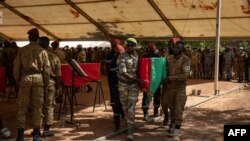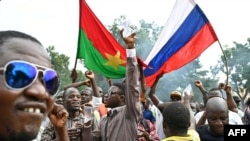Backers of Burkina Faso's latest coup cited the military's failure to stem a deadly Islamist insurgency that is spreading across the Sahel and has displaced millions of people. A new analysis shows more civilians died in the Western Sahel conflict during the first half of 2022 than in all of 2021.
War has raged between Western Sahel countries and militants linked to Islamic State or al-Qaida for more than a decade.
Analysts say failure to stop attacks helped spark two coups in Burkina Faso, the most recent coming September 30. Both military juntas that carried out the coups cited the inability of the previous government to improve security.
"There was this expectation that a military leader would perform better than a civilian one," said Constantin Gouvy, an analyst for the Clingendael Institute, a Dutch think tank. "What we’ve seen instead is that since January, the security situation has continued to deteriorate."
Data from the Armed Conflict Location and Event Data Project show that nearly 2,300 civilians were killed in the Western Sahel conflict during the first half of 2022. That’s about 400 more than the number killed in the whole of 2021.
In Burkina Faso, one of the previous military junta’s flagship policies for reducing violence was to create “military interest zones.” It called for civilians within conflict-affected provinces to leave for a period so the army could carry out operations against terrorists.
VOA traveled close to one of the military zones and met Jonas Sawadogo, who said he was forced to leave his home because of the policy.
Sawadogo said the military "should have come and done something before it got to this point. Since we have left, we have no idea what they have done to protect our village.”
Grégoire Sawadogo said he had received no support from the government since leaving his home, also in a military zone.
"Since I left, I have been working as a laborer with stone masons," he said. "I get about $4 a day to feed my family: my mother, my wife and my four children. I have to pay the rent, too."
Despite the terrible violence and more than 2.6 million displaced in the Western Sahel, aid workers worry this war will become a forgotten crisis.
Sandra Lattouf, the representative of the U.N. Children’s Fund in Burkina Faso, just returned from Djibo, a town in the country’s north, where for months militants have blocked deliveries of food. Trucks carrying supplies can be seen here, halted because it is too dangerous to travel farther north. One convoy was recently attacked.
Lattouf said children in Djibo are starving to death. "It hurts to see the children suffering," she said. "The population is suffering. We need to talk about Burkina Faso. We need to talk about the Sahel. This is a situation that needs the attention of the world."
As the war in the Sahel intensifies, attacks by militants have begun to spread to coastal West African countries, the next phase in the jihadists' efforts to destabilize the region.





